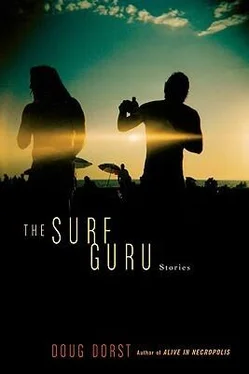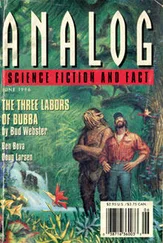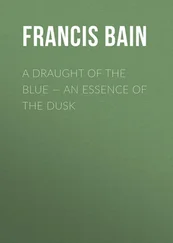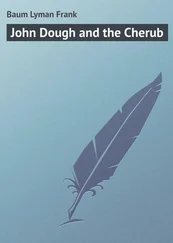“Don’t be silly,” he says. “I love you.” He pats his chest, his legs, as if to say, Look, no weapons.
Shane prances up to them and drops a tennis ball at Wayne’s feet. Wayne winds up and kicks it into a dense patch of pachysandra. The dog runs after it and paws gently through the green, unconcerned as ever.
“I’m hitting the road next week,” she tells him. “You know, driving. Hauling tomatoes.” The lie comes easily. She tries not to look surprised that he buys it.
“I want you to do some thinking while you’re out there,” he says, nodding slowly. “While you’re out there alone.”
She looks into Wayne’s eyes, which are almost all pupil, only a razor-thin ring of blue wreathing the black, and she knows she is staring into the eyes of a dead man. If he’s not dead yet, he will be soon. “I don’t need to think,” she says. “I’ve made up my mind.” She climbs into the driver’s seat of the Fiesta.
“You’ll be back,” he says through the open window, leaning close to her.
A drop of sweat falls from his naked head, and suddenly she feels sorry for him. “Please don’t get your hopes up,” she says. “I couldn’t live with that.” She turns the key and the engine coughs to life.
“I’ll be here,” Wayne says, smiling, rocking back on his heels.
Only then does Jo notice she has parked right behind Wayne’s car, too close, the bumpers almost kissing. She leans her head on the steering wheel. “You have to move your car,” she says without looking up. “I can’t back out.”
Three days later, Jo gets the Fiesta back from the shop and drives out to San Gregorio Beach for the afternoon, where she sits alone watching people and dogs and gulls and fishing boats. When the fog settles in, she drives the twisting roads back toward Spencer’s apartment. Before dinner, they share beers and Percodans on the cramped cement deck overlooking the complex’s pool. They don’t talk much.
The salmon ends up a little burned and the mashed potatoes are out of a box, but that’s all right — Jo doubts she’ll be able to taste much, since the pills have made her mouth numb. Spencer opens a window and tries to wave the smoke out of the apartment, then drops himself into the other chair at the table. He brushes bits of food off the stolen JavaPlenty apron he’s wearing. “So what happens now?” he asks her.
“The Fiesta’s fixed,” she says. “It’s time to get on the road.”
“Why Belize?”
“It sounds like a happy place. Like feliz . Happy.”
“Can you really get all the way down there? There are roads?”
“I’m pretty sure.”
He adjusts his glasses and studies her face, and for the first time in a long, long time, she can’t tell what he’s seeing in her. The smoke alarm goes off, but Spencer waves a dish-towel under it and it falls silent again. “Do you want company?” he asks.
“I don’t think so, no,” she says. She stares at the dinner he has cooked for them. “Thanks, though. Really.”
“If you need money—”
“I’m good, Spencer. Really. I’ve got what I need.”
Long after midnight, under the galaxy of glow-in-the-dark decals on Spencer’s bedroom ceiling, she realizes she does want company. Just not his. Or Wayne’s, or anyone else’s she knows. She turns onto her side and watches him sleep, snoring lightly, with his good ear on the pillow. She’ll be able to leave without waking him.
It’s three a.m. and the sprinklers are still on. Their steady beating washes away the clink of the flowerpot as Jo removes the key from under it. The side door opens noiselessly. Inside, she punches a keypad (the code, in phone letters, spells out SHANE) and a winking red light turns cool green. In one hand she has a stick of beef jerky, in the other, a small piece of duct tape to stop the jingle of his tags. She walks toe-to-heel toward the laundry room, her rubber soles quiet on the hardwood. The dog is in his bed, curled up like a fawn. “Hey, baby,” she whispers, petting him softly. “Hey, baby. Hey, Shane.”
The rest of the plan? They’ll drive. As fast as they can. Like two astronauts trying to reach escape velocity.
I owe thanks to a great many people and institutions for their support over the years, especially my teachers and workshop comrades at Stanford and Iowa; the National Endowment for the Arts; St. Edward’s University; the Virginia Center for the Creative Arts; Jay Mandel, Jake Sugarman, Lauren Heller Whitney, and Alicia Gordon at WME; and Sean McDonald, Emily Bell, Matthew Venzon, Liz Hohenadel, and Leslie Schwartz at Riverhead. A thousand gracias to the editors who saw fit to give good homes to these stories, especially Eli Horowitz, Dave Eggers, Howard Junker, Charles Baxter, Don Lee, Bill U’Ren, Michael Koch, Ed Schwarzschild, Kaui Hemmings, Stephen Elliott, and Dave Daley. I’d also like to thank Ben Yalom, Mark Poirier, and Ann Williams for their assistance as first readers; Bill Fagelson and Jennie Burger; Gail Quist; Paul Neimann; Robin O’Keefe; Tom Bailey; Tor Gronborg; Jeff Mengoli; Elizabeth Falkner of Citizen Cake in San Francisco; and Alejandro Escovedo for writing the beautiful song that inspired “La Fiesta de San Humberto el Menor.” Special thanks to Bob Patterson and Tom Parker, who were willing to risk their academic respectability by standing in for Quilcock’s Norwegian nemeses, and to the late botanists who kindly, if unwittingly, lent their images for use in “Splitters”; Charles Wright, Peter MacOwan, Lucien Underwood, Christen C. Raunkiaer, Nicolaj Monteverde, John Medley Wood, James Britten, Eduard Fischer, Frederick Vernon Coville, Matilda Moldenhauer Brooks, Harry Bolus, E. H. Wilson, Ada Hayden, Aaron Aaronsohn, and Nikolai Vavilov.
Above all, I’d like to thank my wife, Debra, who has always thought that my being a writer is a good thing, and who has given me ten years of love, encouragement, and inspiration.
1
Professor of botany at Mulholland University and director of Kingslee Memorial Herbarium, Ventura, Calif.
2
Hart, to his (few) friends.
3
I am not convinced that my father ever took him seriously enough to return his intense dislike.
4
Not surprisingly, my mother sought to keep her collegial relationship with Quilcock a closely guarded secret. For one thing, she was married to my father — a towering, imperial presence — but she was also a woman in a male-dominated field and could not afford to be seen as having anything less than a complete commitment to the academic orthodoxy and social pecking order of the day. It was a time, she lamented more than once, when even the most brilliant scientific work would be ignored if it was known that a woman had done it.
5
If you were a student of his, you surely will remember the difficulty of facing him in such moments!
6
The dispute as to where his collection would be kept was one of Quilcock’s last and greatest battles. See profile of Fitzgilbert, infra.
7
The Complete Field Journals of Aeneas Scottwell-Scott, edited by P. St. J. Kingslee (Boston: Stamen Publishing, 1924), p. 141.
8
These include his magnum opus, the three-volume Scottwell-Scott Manual: Higher Plants of the American Southwest (1901). A review of both men’s field notes proves that Quilcock’s contributions were significant, although Scottwell-Scott did not highlight this fact in the publication itself.
9
Scottwell-Scott wore white — all white, always — and his clothing usually bore the stains of his earthy trade. “His only concession to sartorial splendor,” Quilcock wrote, “was the monogram he had stitched in blue onto every shirt he owned. Sadly, though not surprisingly, this monogram was a source of great amusement to his rivals and their callow students. In tribute, I have had many articles of clothing stitched with my own initials, also in blue.” Of course, this, too, produced snickers in the hallways at Mulholland; indeed, I recall my father delighting in the use of the epithet “hack” on the rare occasions H. A. Quilcock was mentioned in our home.
Читать дальше












